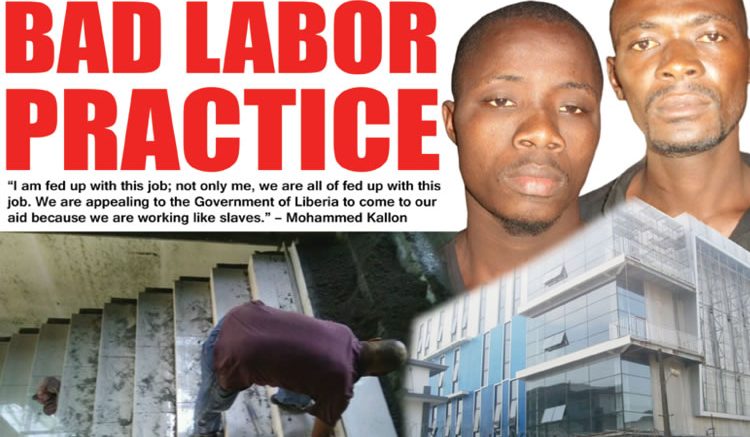Monrovia – Working under bad labor conditions without option, workers of TSMO Construction Company are now growing weary of what they now see as maltreatment on the part of the company against them.
Speaking to FrontPageAfrica, some aggrieved workers of the company lamented that they are paid as low as L$350 which is less than US$4.00 for 12 hours of work on a daily basis.
Their daily feeding and transportation are embedded in the LD$350, they told this paper.
In an attempt to verify the allegation FrontPageAfrica contacted the management of the company who referred FPA to one Eric Sherman who was said to be the only one responsible to speak on the issue. However, Sherman refused to speak to FrontPageAfrica via mobile phone, claiming that the newspaper was attempting to extort money from the company.
Mr. Sherman shunned our reporter in a second attempt to verify the information, stating he had nothing to say.
But the workers who were constructing what would become Liberia’s biggest shopping mall in Mamba Point, Monrovia said they were only working because they had no option, but the money they were earning could not cater to their needs and that of their families.
According to them, they formed a workers’ union to intercede on their behalf and seek redress on their wages, however, they were threatened with dismissal upon the first try to engage management of the construction company.
“We are just working to feed ourselves. We want them add our money up and also feed us,” the secretary of the workers union, Mohammed Kallon said in rather distressful tone.
Kallon lives along the Roberts International Airport highway, he says he cannot go home each day after work because his daily change cannot feed him and at the same time transport him.
“I am fed up with this job; not only me, we are all of fed up with this job. We are appealing to the Government of Liberia to come to our aid because we are working like slaves,” Kallon said.
Another worker Davis Kollie said he live in Paynesville Red-light. Like Kallon, he also cannot go home after work because the money would not be enough to transport him to and from work.
He observed that while they worked 12 hours a day and do not having food to eat, the Chinese contractors were eating three times daily.
“Having observed the many problems we are face with, we wrote the construction company to increase our money but they got vex and threaten to sack our leaders,” Kollie corroborated Kallon’s assertion.
The aggrieved worker continued: “This is wrong; we need better working condition than this”.
According to Kollie, over five of their colleagues have sustained some level of injury on site, but the TSMO did nothing to help them seek medical attention.
Ignoring Decent Work Bill
Liberia’s minimum wage law requires that skilled laborers earn US$5.50 per day.
On 25 June, President Ellen Johnson Sirleaf signed into law the Decent Work Bill, the country’s first labor law since the 1950s.
The act marked the second time Liberia became a forerunner in promoting ILO standards.
In June 2006, Liberia became the first country in the world to ratify the ILO’s Maritime Labour Convention.
The new law is also intended to promote economic development and growth, including by reducing obstacles to efficient business competition.
The new law explicitly promotes fundamental rights at work, including freedom of association and the right to bargain collectively; the right not to be subject to forced or compulsory labour; the right to equality at work, and to equal working conditions regardless of gender or other irrelevant criteria; and the right not to be subject to the worst forms of child labour.
The law also seeks to implement certain fundamental rights found in Liberia’s Constitution.
In January 2016, Labor Minister, Neto Z. Lighe vowed to enforce the new Labor Law to ensure that good labor practices are observed in the country.
He said the ministry would hold institutions across the country responsible for the new Labor Law if they failed to implement and ensure good labor practices.
“We have enough copies already available and have started distributing them to various institutions and hope that employers and employees would also come to the ministry to obtain a copy.”
“This was to be done some months ago and was delayed due to the finalization of the law,” he said.
However, despite this pronouncement by the Labor Minister, many Liberians working in the informal sector continue to experience harsh working conditions while their minimum wage do not commensurate with their work.
Credit: FrontPage Africa

